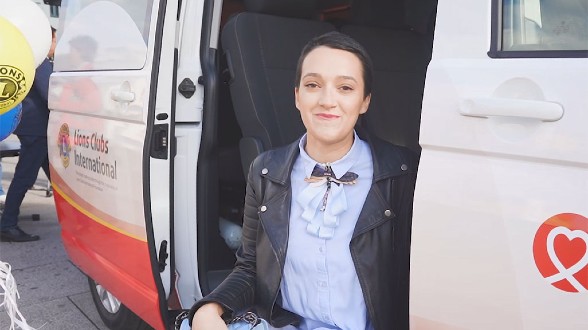
Relief on Wheels
Learning that your child has cancer is unfathomable. It is a moment you will surely never forget, sitting in the doctor’s office, trying to understand the words coming from the doctor, feeling as if the world around you is crashing. It is easy to let your mind think the worst, especially in areas of the world without access to treatment or aftercare.
In Bosnia and Herzegovina, only one hospital provides cancer treatment for children and until Lions and Lions Clubs International Foundation (LCIF) took action, it did not have a follow-up program. Economic hardships and distance make it difficult to maintain regular checkups, so many children and their families are on their own once treatment is complete. With 75 percent of children experiencing complications after treatment, this was a serious inadequacy. Local Lions wanted to ensure their community’s children had access to the critical care needed. A US$36,900 Matching grant from LCIF provided the funding needed for Lions to establish the country’s first mobile follow-up program for childhood cancer survivors in partnership with the local non-profit organization Association Heart for Children (AHfC).
Children can experience psychological issues, delayed development, or reoccurrence of the cancer, among other consequential complications. Absence from school can cause children to struggle with learning. They may have a hard time relating to their friends and need a program to support them as they readjust to life and become proactive about their future health. In addition, the parents and siblings of childhood cancer survivors often experience feelings of anxiety, depression, symptoms of post-traumatic stress disorder, and guilt. These families need guidance on how to be the best support system not only for the child in recovery but for their other children.
Lions purchased and equipped a van with necessary medical equipment, preparing it to travel across the country to children identified by Lions and AHfC. Each visit brings a full team, including a doctor, a nurse, a psychologist, a social worker, and an educator, who all specialize in childhood cancer. In addition, the team will include a peer counselor, often someone who is also a young cancer survivor. The peer counselor can relate to the child and act as a promising example. The team assesses the children and develops a plan for future follow-up care. Thanks to Lions and AHfC, the van will serve up to 200 children recovering from cancer each year, along with their families, and will provide these services at no cost.
“I am very happy to be sitting in our van, knowing that we will bring a smile to our children’s faces,” says Nejra Musić, childhood cancer survivor and peer counselor. “We are happy to have lived to see it happen.”

 Kopioi linkki
Kopioi linkki Palaa kotisivulle
Palaa kotisivulle